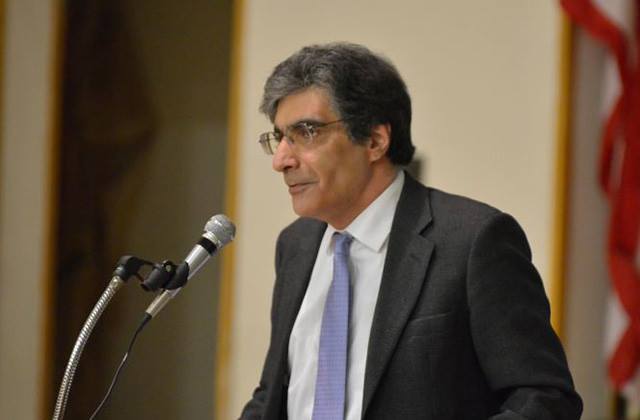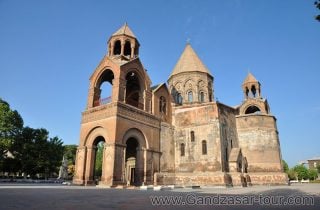After the April war Armenian diplomacy should introduce new accentuations: Ruben Shugaryan

Interview with Ruben Shugaryan, Armenia’s Ambassador to the U.S. (1993-1999), Deputy Foreign Minister of Armenia (2001-2005), Armenia’s Ambassador to Italy (2005-2008), currently professor at U.S. Tufts University’s Fletcher School of Law and Diplomacy. He recently delivered a lecture on “Remedial Sovereignity and the Karabakh conflict” at the department of Political Science and International Affairs of the American University of Armenia (AUA).
Mr. Ambassador, how will you comment on the existent situation in Nagorno Karabakh, following the April war?
Naturally, currently I’m not aware of the negotiations’ agenda. I may say the following: after the April war essence of NK conflict has been completely changed. I don’t want to discuss confrontation of the Armenian side, heroic act of Armenia’s youth, which was notable, which was awakening, which unfortunately, lasted for a few days. I mean the civil society, the authorities, all the sides. However, I’d like to touch upon Azerbaijan’s pursued policy. It acts exclusively by a different scenario, which, if I attempt to compare or draw parallel lines, reminded me Aliyev’s attitude after Ramil Safarov’s extradition.
It was quite a different level. I may surely state, that in the period of father Aliyev, we edified rather disappointing phenomena, however, likewise manifestations haven’t been recorded in that period. Currently the occurrence isn’t only bad, but a primitive and cave-level policy.
On account of all that, what accentuations should the Armenian diplomacy use?
I wouldn’t say that the diplomacy or the diplomatic process should be changed. OSCE MG is a correct, necessary format for Armenia and Nagorno-Karabakh, we may be a bit more content or criticize the activity of that group, however, OSCE MG isn’t only a format, but also an institutional experience and memory. This is the format, where Azerbaijan has limited possibilities. In the UNO, where Azerbaijan was attempting to move the settlement process, there are wider settlement possibilities for Azerbaijan. We saw UN mediation in Abkhazian conflict, which ended with no result.
However, states of Islamic conference are existent in the UNO, and Azerbaijan attempted to use that fact. Of course, some accentuations should be changed, as nowadays, I consider, this all should give a hint that in international instances we respectively rose the following ideas—“recognition for the sake of salvation,” “sovereignty for the sake of salvation” and “beyond the borders of Azerbaijan for the sake of salvation.” We should function these ideas and our arguments should be based on new realities, challenges. Of course, we have always claimed and we still do that NK conflict isn’t a religious conflict. Azerbaijan was attempting to give a religious shape to this.
Armenia and Karabakh have never touched upon it, as they realized, that just the contrary, this isn’t even an ethnic conflict, this is a conflict based on international law, physical security, living a free life. We always had rather good ties with the Muslim world, in particular, perfect relations with Iran, with the Arabic world, however, Azerbaijan has always attempted to establish a situation among the Islamic conference, as well as in different instances, that this is a religious conflict. Currently, I consider, by insisting that this isn’t a religious conflict, we should attempt to draw parallel lines between the activities of current terror groups—ISIS and Azerbaijan.
When we currently touch upon exact actions in the West, that in April Azerbaijan has attacked, Karabah attempted to defend itself, it doesn’t attach big attention. Yes, it’s a conflict, which isn’t frozen. However, when one starts touching upon the conflict form, as well as what Azerbaijan did not only during the outbreak, but after Ramil Safarov’s extradition, the aggressive statement by Aliyev on occasion of the opening of the airport in Stepanakert. When all this is introduced in one package, a new legal ground may be established, and I consider, this should be our accentuation. This is my personal, academic opinion.
Together with territorial integrity and the right to self-determination, you touched upon adding a humanitarian component. What does it presuppose?
Just what I have touched upon. The one can’t exist without the other. I spoke of internationalization of remorse. No matter how strange it may sound, it’s becoming an international norm. It was something mentioned by Kofi Annan for the first time, which comes together with this new norm.
What productivity these accentuations will have under Russia’s current ambitions? In Armenia, particularly, after the April war, there is rather serious distrust on the policy pursued by Russia in the conflict zone.
Yes, but Russia attempted to do the same during the developments in Crimea. In that case there was no physical threat. However, when it was doing the same in Georgia’s case, in particular, South Ossetia and Abkhazia, its steps were justified from that perspective, if it didn’t go even further. However, from the perspective of physical security they were justified, as at least there was people’s discontent, and Russia interfered at that time, so that the international community perceived so. Although it didn’t perceive that way, there was a threat, Russia attempted to provide physical security. Russia has numerous likewise conflicts. No matter how strange it may sound, it attempted to use the same arguments during the Crime developments, which we did in the first years of Karabakh. I don’t consider, that for this very reason we may face issues in Russia. Let me mention again, this is a personal approach.
By Araks Martirosyan

























